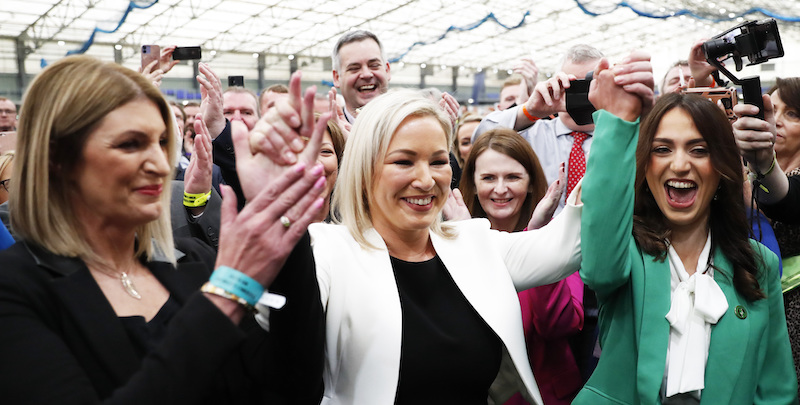Loading player
In Northern Ireland, for the first time in its history, the left-wing nationalist party Sinn Féin, which has among its objectives the reunification of Ireland with Northern Ireland, will get the majority of seats in parliament. It is a result predicted for weeks by the polls, but still considered historic: according to several observers it could contribute to make the plane even more inclined towards a reunification of the two Irish. At least for now, however, it doesn’t seem like an imminent possibility. The results are not yet definitive but the leader of the DUP, a unionist party and ally of the British Conservatives, has already recognized the victory at Sinn Féin.
– Read also: Da dove arriva il Sinn Féin
In Thursday’s elections it was voted to renew the 90 seats in the country’s unicameral parliament, to which the UK statute guarantees a certain autonomy from the British parliament. Turnout was 63.6 percent, slightly lower than in the 2017 election.
The long counting times (at the moment about two thirds of the seats have been assigned) are due to the fact that in Northern Ireland people vote with the “Single transferable vote”: provides that the voters preferably put several candidates in the list and that, through subsequent recounting, certain votes can be assigned to candidates marked on the ballot in second place or even higher. The results discussed so far concern only the so-called “first preferences”.
Having obtained a majority of seats in parliament, Sinn Féin will now have to appoint the next prime minister, of the two who will govern the country. Unlike other countries, in fact, Northern Ireland has two prime ministers, with absolutely equal powers and who in fact constitute a kind of diarchy: they must govern together and if one of the two resigns the office of the other also ends automatically. . It is a very particular modality of government that was decided with the Good Friday agreements of 1998, those that put an end to the civil war that had marked the history of the country for thirty years, the so-called Troubles: the idea was to allow the leaders of the two opposing factions, unionists and nationalists, to govern together and agree on the interests of their respective electorates.
The main novelty, considered and historical event, concerns the fact that, since 1921, that is, since the existence of Northern Ireland, the prime minister has always been of unionist extraction. Since 2007 it has been expressed by the DUP, but now it will be of nationalist extraction, expressed precisely by Sinn Féin, a party with a particular and rather controversial history.
Sinn Féin in Gaelic means “ourselves”: the party was founded in 1905 on the initiative of the Irish journalist Arthur Griffith. From its earliest years of activity, it had as its objective the achievement of self-determination and full Irish national sovereignty, which should have passed through the end of the political union then in force with Great Britain. Sinn Féin then fought for independence from Great Britain during the so-called “Easter uprising” of 1916, which ended with the defeat of the rioters, supported the Irish Republican army during the War of Independence from Great Britain, and split undergoing various splits in 1921, when the division of the island was sanctioned and Northern Ireland was created.
The Sinn Féin struggle continued in the late 1960s and late 1990s during the civil war of the Troubles: in recent years he was very close to the paramilitary organization IRA (Irish Republican Army), practically considered his armed wing and of which he was seen as a kind of parliamentary counterpart.
During the electoral campaign for these elections, Sinn Féin was quite able to distance itself from the most controversial aspects of its history: the current leadership has in fact kept away from the question of unification to focus everything on the so-called issues bread-and-butter (“Bread and butter”), that is, close to people’s daily lives: health care, unemployment, rising cost of living, housing issue. The fact that the party has changed a lot from a generational point of view has also contributed to this, given that it is now composed mainly of people who grew up after the years of Troubleswho therefore never participated in the violence and in fact gained their political experience in the years following the peace agreements that ended it.
According to various analyzes, all this has contributed to the success of Sinn Féin, and it is also the reason why, at least for now, a referendum for the reunification of Ireland does not seem imminent: it is still a very important issue. divisive and in the polls that include the entire population, reunification is considered a priority only by a minority, estimated at around 17 percent. The fact remains that the victory of Sinn Féin, combined with the progressive reinforcement of the Scottish Nationalist Party, would help make the UK look like more disunited than ever.
The weakening of the DUP, the main unionist party, which had dominated Northern Irish politics in recent decades, also contributed to the victory of Sinn Féin.
The loss of the consensus of the DUP is mainly linked to Brexit: the DUP is a close ally of the British Conservatives and had strongly supported the United Kingdom’s exit from the European Union. In recent years, however, it has received increasing criticism from its supporters for indirectly contributing to the approval of the Protocol on Northern Ireland, the treaty on the status of the country contained in the broader agreement between the United Kingdom and the European Union on Brexit. The protocol provides for Northern Ireland to remain both in the European common market and in the customs union: in fact, it has moved away Northern Ireland from the rest of the UK. For this reason many of the supporters of the DUP have in the meantime moved to other unionist parties, disappointed by the lack of foresight shown by the alliance with the British Conservatives.
Pending the definitive results of the Northern Irish elections, negotiations are already being envisaged long and tight to appoint the two prime ministers. “For the formation of a new Northern Irish executive,” wrote the Guardian, “It could take up to six months”, but it is also possible that voting will start again in winter. The latter hypothesis could occur in the event that, as it seems at the moment, the DUP – the second most voted party – were to choose not to be part of a government together with Sinn Féin.
–


